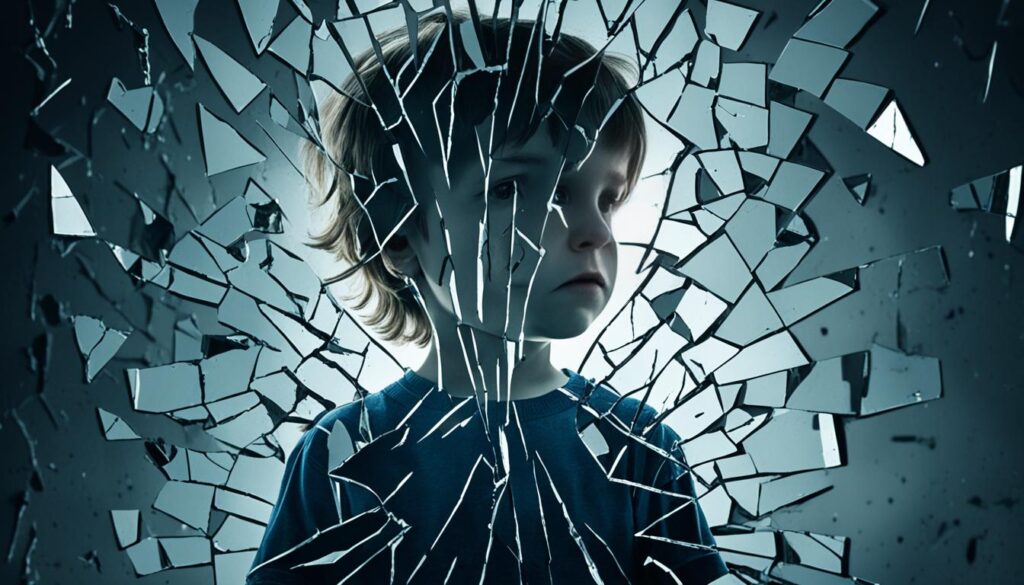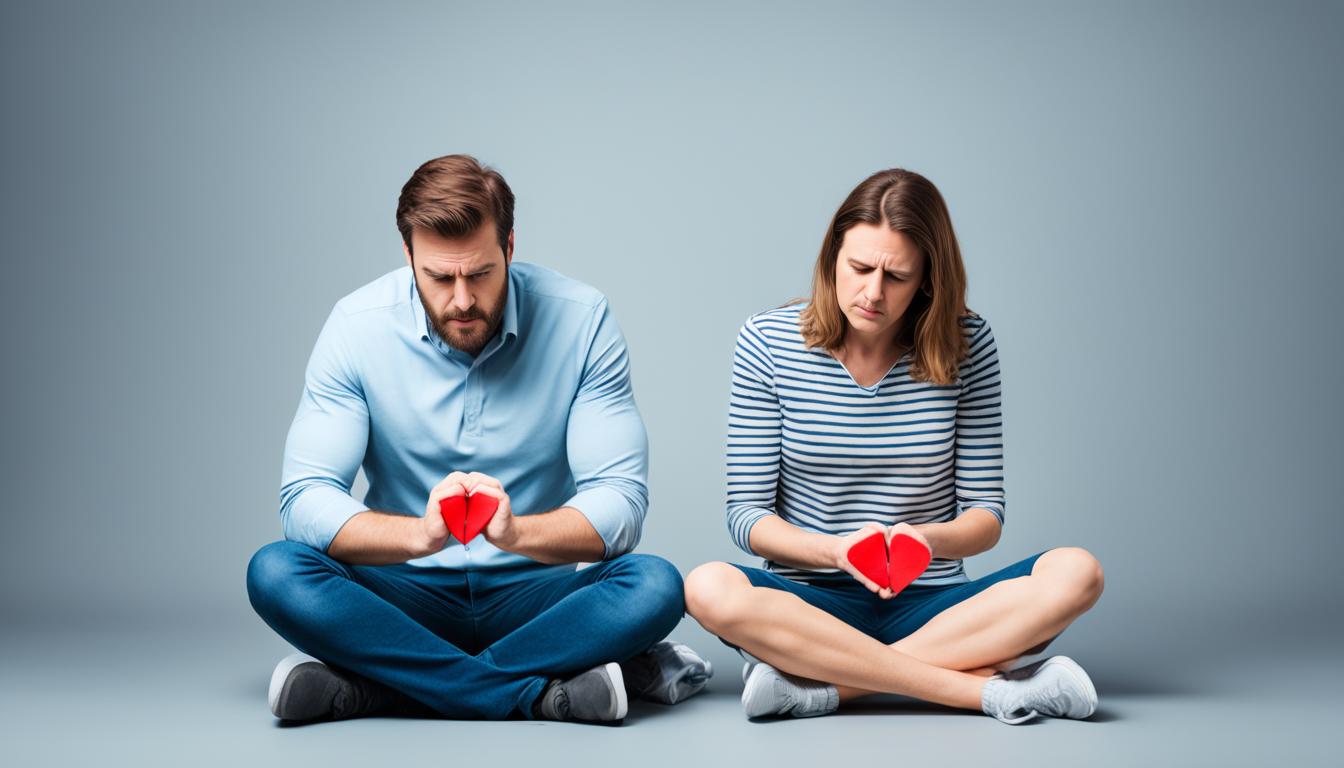“You will not be punished for your anger; you will be punished by your anger.” – Buddha
Dealing with hurtful behavior can be incredibly challenging, especially when the person who hurt you becomes angry in response. It’s natural to wonder why someone would get mad when they are the ones who caused the pain. Understanding the complex emotions behind these reactions is the first step towards healing and personal growth.
In this article, we will delve into the psychology of guilt and anger, exploring the reasons why someone might react with anger when they have hurt someone else. Drawing from Buddhism’s teachings on mindfulness and compassion, we will offer strategies for addressing hurtful behavior and managing the emotions that arise from causing pain to others.
Key Takeaways:
- Anger may arise as a defense mechanism to protect oneself from feelings of guilt and shame.
- Understanding the complex emotions behind hurtful behavior can help foster empathy and compassion.
- Practicing mindfulness and self-reflection can aid in healing and personal growth.
- Seeking professional help and support from friends and loved ones is essential in the journey of healing.
- Forgiveness, both for oneself and others, plays a crucial role in the process of transforming hurt into healing.
The Relationship Between Childhood Trauma and “Crazy” Behavior
Many people who exhibit “crazy” behavior in relationships are actually acting out subconscious wounds from their past. Childhood trauma, abuse, and abandonment can have a profound impact on an individual’s sense of self and their ability to form healthy relationships. Unresolved childhood issues often manifest as unhealthy behaviors, creating a cycle of pain and fear.
When childhood wounds are left unaddressed, they tend to resurface in adult relationships. The trauma and pain that were once experienced during childhood may manifest as outbursts, erratic behavior, or emotional instability in relationships. These behaviors can be confusing and even frightening for both the person acting them out and their partner.
Childhood abandonment, in particular, can have a severe impact on one’s sense of self. When a child is abandoned by a parent or caregiver, they are left with deep emotional scars. This abandonment can lead to feelings of unworthiness and a constant fear of being left behind. As a result, individuals may exhibit clingy or possessive behavior in their adult relationships, constantly seeking reassurance and validation.

It’s important to understand that these “crazy” behaviors are not a reflection of someone’s character or inherent craziness. Rather, they are symptoms of unresolved trauma and pain. By recognizing this, individuals can begin to address their childhood wounds and take steps towards healing and creating healthier adult relationships.
The Impact of Abandonment on Sense of Self
Childhood abandonment can shatter one’s sense of self, leaving them feeling unlovable and unworthy of healthy relationships. This deep-seated belief can permeate every aspect of their life, affecting their self-esteem, confidence, and ability to trust others.
When individuals with a history of abandonment enter into relationships, they may struggle with intense fear of rejection and abandonment once again. This fear can lead to clingy and possessive behavior, as they try to hold onto their partner tightly. They may constantly seek validation and reassurance, fearing that their partner will leave or betray them.
Furthermore, the impact of childhood abandonment can also manifest in difficulties with emotional regulation. Individuals may experience intense mood swings, unpredictable reactions, and heightened sensitivity to perceived threats of abandonment. These emotional ups and downs can create chaos and instability within relationships.
Coping with Emotional Pain
Coping with the emotional pain stemming from childhood trauma requires patience, self-compassion, and professional support. It’s important for individuals to create a safe space for themselves to explore and process their past experiences, allowing themselves to feel and heal.
Therapy and counseling can be instrumental in helping individuals navigate their past trauma and develop healthier coping mechanisms. Through therapy, individuals can gain a deeper understanding of their behaviors and emotions, learning how to manage their feelings in a healthier way.
In addition to professional support, practicing self-care and self-compassion is crucial. Engaging in activities that bring joy, seeking support from loved ones, and practicing mindfulness can all contribute to emotional healing and growth.
| Signs of Childhood Trauma Manifesting in Adult Relationships | Impact on Relationships |
|---|---|
| Trust issues and fear of abandonment | Difficulty forming secure and trusting relationships |
| Clingy and possessive behavior | Need for constant reassurance and validation |
| Emotional outbursts and mood swings | Instability and turbulence within relationships |
| Difficulty with emotional intimacy | Difficulty connecting on a deep emotional level |
By acknowledging and addressing the impact of childhood trauma on adult relationships, individuals can begin the journey of healing and creating healthier, more fulfilling connections.
The Power of Forgiveness in Healing
Forgiveness is a transformative act that has the power to release us from the burdens of grudges and bitterness. Letting go of the negative emotions associated with past hurt can have profound effects on our mental and physical health, as well as our relationships.
The Benefits of Forgiveness for Mental and Physical Health
When we hold onto grudges and bitterness, we carry a heavy emotional weight that negatively impacts our well-being. Research has shown that practicing forgiveness can lead to improved mental health, including reduced levels of anxiety and depression.
Forgiveness also has physical health benefits. Holding onto anger and resentment can contribute to increased stress levels, which in turn can lead to a variety of health issues such as high blood pressure, heart disease, and weakened immune function. By releasing these negative emotions through forgiveness, we can promote better physical health and overall well-being.
Improving Relationships through Forgiveness
Forgiveness not only benefits ourselves, but it also has a profound impact on our relationships with others. When we choose to forgive, we let go of the barriers that prevent deeper connection and understanding. By releasing the negative emotions associated with past hurt, we create space for compassion, empathy, and healing.
Through forgiveness, we can mend damaged relationships, foster trust and reconciliation, and strengthen our connections with others. It allows us to move forward without carrying the weight of resentments, enabling us to build healthier and more fulfilling relationships.
Releasing Negative Emotions and Finding Inner Peace
One of the most powerful aspects of forgiveness is its ability to release negative emotions. When we forgive, we free ourselves from the burden of anger, resentment, and pain. It is a liberation of the heart and mind that allows us to find inner peace and move forward with our lives.
Letting go of grudges and bitterness opens up space for positive emotions such as joy, gratitude, and love. It allows us to focus on the present moment and embrace a mindset of growth and self-improvement. By choosing forgiveness, we pave the way for personal healing and transformation.

| Benefits of Forgiveness | Effects on Mental and Physical Health | Impact on Relationships | Release of Negative Emotions |
|---|---|---|---|
| Improved mental health | Reduced anxiety and depression | Mending damaged relationships | Release of anger and resentment |
| Better physical health | Reduced stress levels | Fostering trust and reconciliation | Inner peace and freedom |
| Prevention of health issues | Stronger connections with others | Positive emotions and growth |
Recognizing Unhealthy Relationship Patterns
In any relationship, it’s essential to be aware of signs of unhealthy behaviors that might be present. These behaviors can indicate deeper issues within the relationship and may be detrimental to your emotional well-being. By recognizing these patterns, you can make informed decisions about whether to continue or walk away from an unhealthy relationship. Here are three key questions to help you identify and understand these patterns:
- Do their actions frequently contradict their words?
- Do you frequently make excuses for them?
- Do they turn blame onto you?
Inconsistent actions and words can be a red flag for unhealthy relationship patterns. Pay attention to situations where their behavior doesn’t align with what they say. For example, if they constantly promise to change but never follow through, it may be a sign of manipulative behavior.
Making excuses for someone’s mistreatment is a common behavior in unhealthy relationships. You might find yourself justifying their actions or rationalizing their behavior. If you often find yourself defending their actions to others or downplaying their negative behavior, it may be a sign that you’re tolerating mistreatment.
In unhealthy relationships, the person who is mistreated often becomes the target of blame. They might shift responsibility for their actions onto you or make you feel guilty for their behavior. This tactic is a way of manipulating you and diverting attention away from their actions.
By honestly answering these questions, you can gain clarity about the presence of unhealthy relationship patterns in your life. Remember, recognizing these patterns is the first step towards healing and creating healthier connections. Trust your intuition and prioritize your well-being.

If you have identified any of these patterns in your relationship, it may be time to seek support from trusted friends, family, or professionals who can provide guidance and advice. Remember, you deserve to be treated with respect and kindness. Taking steps to address unhealthy patterns can lead you to a more fulfilling and loving relationship.
| Signs of Unhealthy Behaviors |
|---|
| Inconsistent actions and words |
| Making excuses for someone’s mistreatment |
| Turning blame on the victim |
Conclusion
Healing from hurtful relationships is a journey that starts with self-acceptance and self-love. By acknowledging the wounds of the past and taking responsibility for our actions and choices, we can break free from negative relationship patterns and prioritize our own well-being. It is through this process that we find the strength to heal and embrace a brighter future.
One crucial aspect of this journey is personal growth. By actively seeking opportunities for growth and self-improvement, we empower ourselves to create healthier and more fulfilling relationships moving forward. This may involve seeking support from friends and professionals who can provide guidance and assistance along the way.
Remember, the path to healing is not always easy, but it is worth it. Embrace the journey, and let go of the pain and burdens that hold you back. Prioritize your own well-being and invest in the love and care you deserve. As you embark on this transformative journey, may you find healing, self-acceptance, and a renewed sense of purpose and joy.
FAQ
Why does someone get angry when they have hurt someone else?
When someone hurts another person, they may experience feelings of guilt, shame, and remorse. Anger can be a defense mechanism to protect oneself from these uncomfortable emotions. It may also be a reaction to feeling out of control or a way to deflect responsibility onto the other person.
How can I deal with someone’s hurtful behavior towards me?
It is important to set boundaries and communicate your feelings assertively. You can also seek support from friends or professionals who can offer guidance and perspective. Remember to prioritize your own well-being and consider whether the relationship is healthy for you.
What are some common emotional reactions to causing pain to others?
Common emotional reactions to causing harm include guilt, shame, anger, and sadness. It is natural to feel remorse when we realize the impact of our actions on others. Understanding and processing these emotions is essential for personal growth and healing.
How can I manage the emotions that arise from causing pain to others?
Practicing mindfulness and self-compassion can help you navigate the complex emotions that arise from hurting someone. Take time to reflect on your actions, apologize sincerely, and engage in activities that promote self-care and self-reflection.
What is the psychological impact of causing harm to others?
Causing harm to others can have a significant psychological impact. It can lead to feelings of guilt, shame, and self-doubt. It may also damage relationships and impact one’s self-esteem. Seeking therapy or counseling can be beneficial in exploring and addressing these psychological effects.
How can I cope with the hurt and anger I feel after hurting someone?
Coping with hurt and anger after causing harm involves acknowledging and taking responsibility for your actions. Engage in self-reflection, seek forgiveness from the person you hurt, and consider seeking therapy to address underlying issues that contributed to your harmful behavior.
What are some strategies for addressing hurtful behavior?
To address hurtful behavior, it is important to identify patterns and triggers, seek therapy or counseling, develop healthier communication and conflict resolution skills, and practice empathy and compassion towards others.
How can I understand the reactions of others when I have hurt them?
It is important to approach their reactions with empathy and open-mindedness. Remember that they may be experiencing a range of emotions, including anger, hurt, and betrayal. Allow them to express their feelings and be patient as they process the impact of your actions.
Why is it important to understand the impact of our hurtful actions?
Understanding the impact of our hurtful actions allows us to grow and become more compassionate individuals. It helps us develop empathy towards others and motivates us to take responsibility for our actions. By recognizing the consequences of our behavior, we can strive to make positive changes and foster healthier relationships.
What steps can I take to heal from hurting others?
Healing from hurting others involves acknowledging the pain you caused, apologizing sincerely, making amends if possible, and committing to personal growth and change. It may also be helpful to seek therapy or counseling to address underlying issues that contributed to your harmful behavior.

